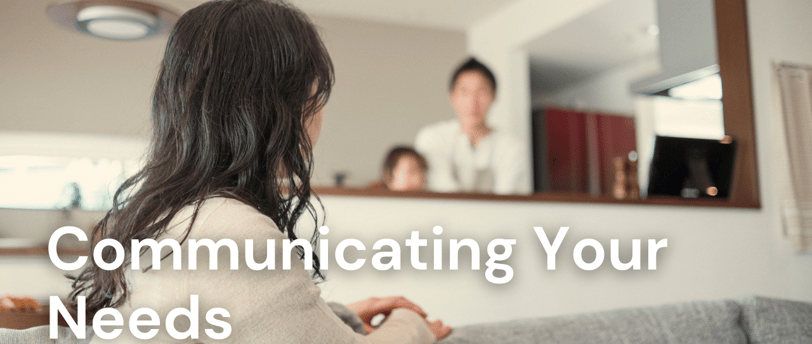Communicating Your Needs When You Have PPD
7/1/20254 min read


Postpartum depression (PPD) has a way of silencing people—not because they have nothing to say, but because depression makes expression feel impossible. Between the emotional exhaustion, guilt, and confusion, many mothers struggle to name their needs, let alone ask for support. Yet, this is exactly when connection and understanding matter most.
For those navigating the heavy fog of PPD, communicating needs can feel like another task you don't have the energy to complete. You might think, “No one will understand,” or “They have their own problems—I don’t want to be a burden.” But the truth is, your needs are valid, urgent, and worthy of being heard.
At Peace Temple, we work with mothers every day who feel invisible inside their own homes, unsure how to reach out, afraid they’ll be judged, or simply too overwhelmed to try. Learning to communicate while living with PPD isn’t easy—but it is possible, and more than that, it’s transformative.
Why Communication Feels So Hard With PPD
PPD impacts not just how you feel—but how you think and relate to others. Common barriers to communication include:
Low self-worth: Feeling like your needs are unimportant or that you're a burden
Guilt and shame: Believing you're “failing” and should fix everything yourself
Cognitive fog: Difficulty forming coherent thoughts or expressing them clearly
Fear of judgment: Worrying that loved ones or healthcare providers won’t take you seriously
Emotional withdrawal: Wanting to isolate rather than engage
When these feelings go unspoken, they tend to accumulate silently, often leading to resentment, deeper depression, or emotional disconnection from partners, family, and friends.
What Does Needs Look Like in the Context of PPD?
Needs during postpartum depression aren’t just about rest or chores (though those matter too). They’re about emotional presence, understanding, and compassion.
You might need:
Help with daily tasks without having to ask every time
Space to cry without being told to “look on the bright side”
Someone to sit beside you during hard moments, without needing to fix them
Validation that you’re not imagining things
Time away from the baby to reset, without guilt
Encouragement to seek therapy or treatment
At Peace Temple, we help mothers identify and name these needs—because once named, they can be shared, and once shared, they can be met.


Steps to Start Communicating Your Needs
1. Acknowledge That You Deserve Support
This is the foundation. Repeat it to yourself if you have to:
"Needing help does not make me weak. Communicating my needs is a form of strength."
PPD is not a flaw in your character—it is a health condition that deserves care. Just as someone with a broken leg wouldn't hesitate to ask for crutches, your emotional pain also warrants accommodation and assistance.
2. Get Clear on What You Need
You may not know what you need right away—and that’s okay. Start by noticing:
What feels hardest right now?
When do you feel most overwhelmed or alone?
What tasks or moments make you most anxious?
Write these down or voice-record your reflections. Even one small need (like "I need a nap") is worth articulating.
3. Use “I” Statements to Avoid Blame
When emotions are high, it's easy to express frustration as blame. But “I” statements help your needs be heard without triggering defensiveness.
Try:
“I’m feeling really overwhelmed and could use help with the baby’s next feed.”
“I’m having a hard day emotionally and just need someone to sit with me.”
“I feel disconnected and need to talk without judgment.”
At Peace Temple, we coach clients on communication skills that empower their voices—without shame or apology.
4. Practice Low-Stakes Communication First
Start small. Communicate one need to someone safe—perhaps a partner, sibling, or friend. You don’t have to share everything at once. Small conversations build confidence.
Example:
“Could you bring me a glass of water and just sit with me for five minutes? I don’t want to be alone right now.”
Even small requests send a powerful message: you matter.
Tips for Communicating With Partners or Family
Sometimes the people closest to us are the hardest to talk to. Maybe they’re overwhelmed too. Maybe they don’t know what to say. Maybe they’ve never seen you like this and feel helpless.
But silence doesn’t help anyone. Here’s how to start bridging the gap:
1. Set the Tone
Begin with something grounding:
"This is hard for me to talk about, but I need to say it."
"I know things are intense right now, but I really need to feel heard."
2. Be Specific
Vague statements like “I can’t do this anymore” often create fear rather than clarity. Instead, specify:
“I need a 30-minute break without baby duty.”
“Can you please make dinner tonight? I’m mentally tapped out.”
3. Reassure While Being Honest
Partners often interpret emotional distance as rejection. Clarify with something like:
"I still love you—I’m just struggling to show it right now. Please don’t take my withdrawal personally."
Peace Temple’s relationship-focused postpartum sessions help couples navigate these emotional landmines safely and effectively.
What If You’re Met With Resistance or Misunderstanding?
Sadly, not everyone responds with compassion. Some people may minimize your pain or respond with frustration. If this happens:
Remember: their reaction doesn’t define your truth.
Reiterate your request calmly: “I understand you’re tired too, but I need you to take this seriously.”
Seek outside support—from a therapist, support group, or mental health provider.
At Peace Temple, we offer validation and tools to help navigate unsupportive dynamics and build new sources of strength.
Rebuilding Trust With Yourself
Perhaps the most important relationship affected by PPD is the one you have with yourself. Depression often tells you that you’re too much, too broken, too needy. But healing begins when you realize:
You’re not weak for needing support.
Your emotions are not an inconvenience.
Your voice still matters—even when it trembles.
The act of speaking your truth—no matter how softly—is a profound step toward recovery.
Final Thoughts: Your Needs Are Not a Burden—They’re a Bridge
Communicating your needs during postpartum depression may feel like trying to speak underwater—distorted, difficult, slow. But every time you reach out, you chip away at the silence. Every time you name a feeling, you loosen the grip of shame.
At Peace Temple, we believe that healing doesn’t always start with answers. Sometimes, it starts with a single sentence: “I need help.”
You don’t have to say it perfectly. You just have to say it. And from there, healing can begin.
